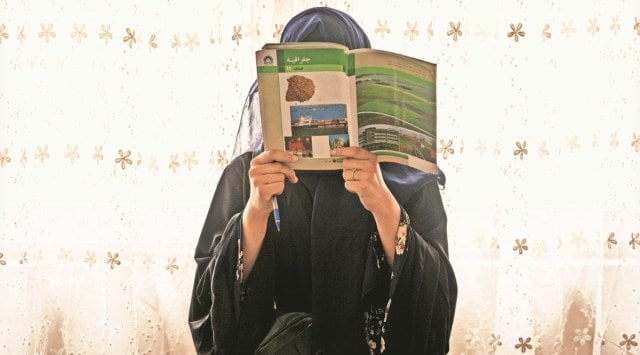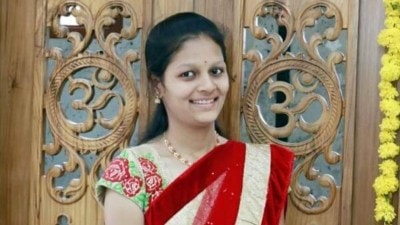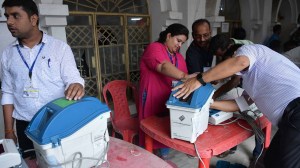- India
- International
In Kabul, Afghan students wait for passage to India: Don’t shut us out
Over 2,500 Afghans, who were students in India until last year, are in the same boat as Sahar. Many had returned home to Afghanistan for the summer break. Some were hoping to obtain visas for the admissions they had secured in colleges across the country.
 An Afghan girl attends a class at an underground school in Kabul on Saturday. AP
An Afghan girl attends a class at an underground school in Kabul on Saturday. APSahar Noor Mohammadi, who won an ICCR scholarship to study a course at Chandigarh’s University Institute of Applied Management Studies, should have written her fourth semester examination in June this year. The course had begun online in 2020 amidst the Covid-19 pandemic. This year, classes shifted back to the classroom, and students were told to appear physically for the examination.
But locked out of India without a visa, Sahar could not write the exam. Other than an automated reply, she has heard nothing more about her e-visa application, though she knows of one person whose application was accepted. With no way to complete her course and get her degree, Sahar says she has lost hope that the future she had planned, of setting up a small business with an Indian friend, has collapsed.
With the Taliban banning all higher education from Class 7 onward, she has no education options left in Afghanistan. “My younger sister’s education has also stopped. She was in Class 8,” said Sahar, as she showed all the desperate messages she sent to her teacher in Chandigarh.
“She just stopped answering. See the number of folded hands (emoji) I have added to every message,” Sahar said.
Over 2,500 Afghans, who were students in India until last year, are in the same boat as Sahar. Many had returned home to Afghanistan for the summer break. Some were hoping to obtain visas for the admissions they had secured in colleges across the country.

Now they are staring at unfinished courses, admissions that cannot be taken up, and in some cases, separation from families left behind in India, after Delhi cancelled all existing visas to Afghan nationals, unofficially citing security grounds in the wake of the Taliban takeover of Afghanistan. It has issued barely 200 visas out of the thousands of applications for emergency e-visas it has received since then.
Onib Dadgar, a topper of his Bachelor of Computer Applications course at Jamia Millia Islamia and gold medallist in the MCA course at JNU, has secured admission for a PhD course in Mysore University. He cannot imagine that India, which he called his “second home” when he was invited to speak at the Ministry of External Affairs in 2019, has not approved his visa application.
His PhD application for research on big data required two published papers. He returned to Kabul to work on them. On August 15, his existing visa to study in India was cancelled when Delhi invalidated all visas issued to Afghans, citing a security scare due to the Taliban takeover.
“Why involve students with valid visas in this security issue? Students pose no security risk to India. When we were in India for so many years, no one said we were a security threat then,” Dadgar said. “You only know your true friends in times of difficulties,” he said.
Onib has spent the last year appealing to Indian officialdom through various channels – through Indian media, former President Hamid Karzai, former Vice-President Abdullah Abdullah, the Afghan Ambassador in Delhi, on social media – all to no avail yet.
Those who have applied for visas cannot help noticing that India has evacuated Hindus and Sikhs in several batches. But even thinking aloud the possibility that their religion might have gone against them is difficult for many.
“We have grown up loving India, its movies, its culture. For us, it is the safest place, because of our historical links, natural affinity, the language, everything. Victimising students for the security issue is not on,” said Haroon Wali, a research scholar at the English and Foreign Languages University in Hyderabad.
Wali now faces dismissal from his job as an Assistant Professor at an Afghan educational institute which funded his studies at EFLU, and the demand to return the entire funding, as he has not been able to fulfill the main requirement for the financing — that scholars submit regular progress reports or a degree.
“How can I do that when I am here? I have no progress to report. I am broke, I am in a financial crisis, and I am in every other kind of crisis,” he said.
For at least two generations of Afghans who did not, unlike many of their compatriots, have the means to fly out to Western countries as the country went from one big war in the 1980s to another from 2001, the opportunity to study in India, and ICCR’s scholarship scheme, were literally life savers.
Pointing out that 16,000 students have been “supported” by India since 2001, Wali said it was because India knew these students would be its best ambassadors in Afghanistan. “This is what Pakistan wants to achieve but cannot. It is unthinkable that India has left us in the lurch,” he said.
Every country including China, Pakistan, Turkey and Russia that had Afghan students stuck in Afghanistan during the Taliban takeover either evacuated them immediately or arranged for their visas, Dadgar said, “but not India”.
Some senior scholars unable to return to India have families there. They had left them behind, believing their own return to India was imminent. Gulab Mir Rahmany’s wife and three children are in Kerala. His wife is pursuing a PhD in Physics in Kerala University. Rahmany is also a doctoral student in the same university.
After failing to get any response to his e-visa application, he went to Iran in February to try his luck from there. He has now maxed his Iranian visit extensions and is desperate.
“I have been away from my wife and children for more than one year. Imagine the depression my wife and I are undergoing. She has to do her course work, she is in the lab, and she has to look after the kids,” he said. “My request is that the Government of India should assess its position neutrally, see the record of the students. Every student has a track record. I have my supervisor who knows me, knows my work.”
Habibullah Rashad is another separated husband and parent. He completed his Master’s in Environmental Sciences from Osmania University. He and his wife returned to their home in Mazar-e-Sharif in May 2021 during the Delta wave of the pandemic. But his wife got a call from Osmania University, where she had been accepted as a PhD scholar on a ICCR fellowship, asking her to return and complete the process.
“I sent my wife and our two-year-old twins back to Hyderabad, thinking I would follow them in a few weeks. But everything changed and my visa was cancelled,” Rashad said. “They cannot come here because of the situation here, and I cannot join them. We have been separated cruelly.”
Best of Express

Apr 19: Latest News
- 01
- 02
- 03
- 04
- 05





































